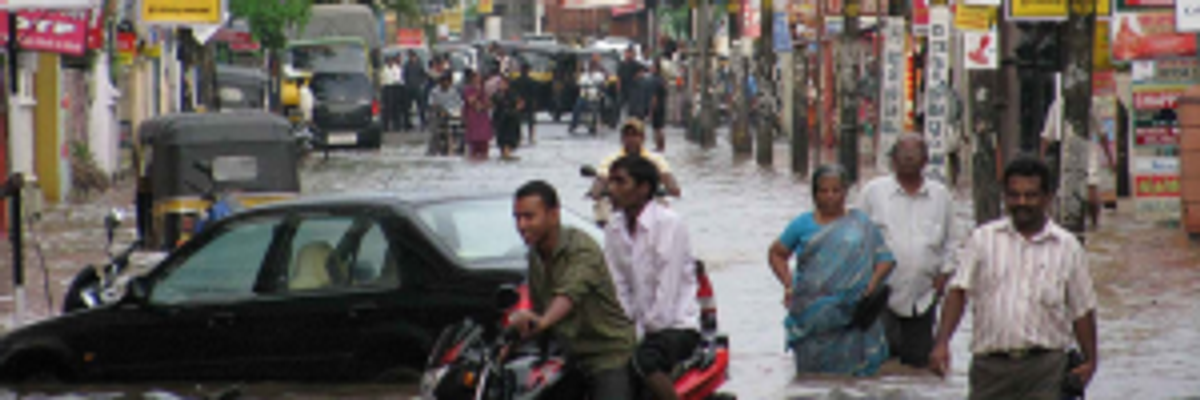Over the last few days, an estimated 350 people have been killed and 800,000 displaced in the worst flooding to hit the Indian state of Kerala for over a century.
Thousands remain marooned by unusually intense monsoon rains. Between June 1 and August 17, the southern state has already received 2,305 mm of rainfall, which over 40% higher than normal.
The country's Airforce and Navy are still searching for people stranded on rooftops. In the town of Chengannur an estimated 5,000 could be trapped.
Hopefully the waters are set to recede over the next few days, although the authorities are concerned that there could be an outbreak of water-borne and other diseases. So far the floods are reported to have cost over $2 billion in damage, although this is widely expected to increase.
Local and international experts are warning that the intensity of the Monsoon rains is another impact of our changing climate: A study in Nature last year concluded that there has been a threefold increase in widespread extreme rain events over central India during 1950-2015.
During that period, there have been 268 reported flooding events in the country affecting about 825 million people, leaving 17 million homeless and killing about 69,000 people.
During that period, there have been 268 reported flooding events in the country affecting about 825 million people, leaving 17 million homeless and killing about 69,000 people.
The increasing flooding "appears to be linked to the rapid surface warming in the northern Arabian Sea and the adjacent northwest India and
Pakistan, which emerge as the largest ocean and land surface trends in the South Asian domain," according to Nature.
One of the authors of that study, Dr Roxy Matthew Koll from Indian Institute of Tropical Meteorology, Pune says: "When there is more rain than the soil can absorb, water will quickly run-off overwhelming streams, drains and rivers, and causing flash floods."
Another local expert, Dr Pai, head of the Climate Prediction Group, at the India Meteorological Department, argues: "Heavy rainfall used to occur in Kerala, but not with such continuity. This time, there has been widespread rain continually for a long time which has not been seen in recent years. However, we have observed that the intensity of daily rainfall is indeed increasing, especially along the western coast and in the north-eastern states."
Malti Goel, former advisor, department of science and technology and founder, Climate Change Research Institute, Delhi told livemint.com that: "It was expected that extreme weather events would increase because of climate change, and it is happening across the globe. India is more vulnerable because of its wide geographical and demographic variations. This makes it all the more important to strengthen our climate mitigation plans,"
Muralee Thummarukudy, head of disaster risk reduction in the UN Environment, also told Khaleej Times: "What is predictable is that climate change which is happening across the globe is going to accelerate the rate at which the extreme events are happening."
Thummarukudy is right: 2018 will be remembered as a year of extreme events. And things look set to get worse. As the Guardian reports today reporting on new scientific research: "Summer weather patterns are increasingly likely to stall in Europe, North America and parts of Asia, according to a new climate study that explains why Arctic warming is making heatwaves elsewhere more persistent and dangerous."
The new research, published in Nature today, warns we face "very extreme extremes", which occur "when abnormally high temperatures linger for an unusually prolonged period, turning sunny days into heat waves, tinder-dry conditions into wildfires, and rains into floods."




